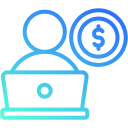This website uses cookies so that we can provide you with the best user experience possible. Cookie information is stored in your browser and performs functions such as recognising you when you return to our website and helping our team to understand which sections of the website you find most interesting and useful.
Efficient Budgeting for Freelance Success
Efficient budgeting is vital for anyone aiming to thrive as a freelancer. It provides the foundation for financial security, allows for smart planning, and supports sustained growth. Working independently means complete responsibility over your finances, making it essential to master budgeting to manage irregular income, plan for taxes, save for future goals, and mitigate the unpredictable nature of freelance work. Whether you’re a seasoned freelancer or new to the industry, learning to budget efficiently empowers you to seize opportunities with confidence and weather slow periods without anxiety. This guide outlines key components and strategies designed specifically for freelancers, aiming to foster long-term success and peace of mind in your solo career.
Understanding the Unique Challenges of Freelance Budgeting
Navigating Irregular Income
Accounting for Business Expenses
Planning for Taxes and Withholdings
Setting Realistic Financial Goals and Priorities
Crafting Short-Term and Long-Term Goals
Prioritizing Essential and Non-Essential Spending
Building an Emergency Fund
Implementing Effective Tracking and Automation Strategies


